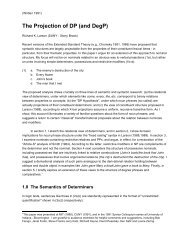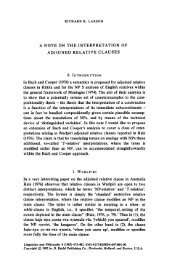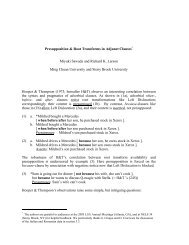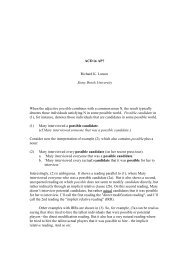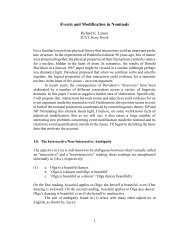Intensional Transitive Verbs and Abstract Clausal Complementation
Intensional Transitive Verbs and Abstract Clausal Complementation
Intensional Transitive Verbs and Abstract Clausal Complementation
You also want an ePaper? Increase the reach of your titles
YUMPU automatically turns print PDFs into web optimized ePapers that Google loves.
<strong>Intensional</strong> <strong>Transitive</strong> <strong>Verbs</strong> <strong>and</strong> <strong>Abstract</strong> <strong>Clausal</strong> <strong>Complementation</strong><br />
4.1 Lack of Adverbial Ambiguities<br />
Partee (1974) expresses doubt about the biclausal analysis of look-for <strong>and</strong> seek given the absence of<br />
adverbial ambiguities of the kind observed with volitional verbs. Thus if the acceptability of (73a),<br />
containing tomorrow plus a matrix past tense, arises through the potential embedded attachment for the<br />
adverb, then we might expect (73b) to be similarly acceptable. But evidently it is not.<br />
(73) a. Max wanted a unicorn tomorrow.<br />
b. #Max looked for a unicorn tomorrow.<br />
On further reflection, however, it is clear that the unacceptability of (73b) cannot be due to the lack of a<br />
lower attachment possibility. To see why, simply note that (74a), which contains an overt infinitival<br />
complement, is just as unacceptable as (74b). Evidently, attachment (74b) can be ruled out on grounds of<br />
the temporal clash; but notice that (74c) must be excluded on independent grounds; something else must<br />
block the lower attachment:<br />
(74) a. #Max tried to find a unicorn tomorrow<br />
b. Max tried [PRO to find a unicorn] tomorrow<br />
c. Max tried [PRO to find a unicorn tomorrow]<br />
In fact, (74c) seems to be ruled out by general pragmatic considerations on what it means to try to find<br />
something. In brief, it seems to us that while one can seek something today with the goal of finding it by<br />
tomorrow, one cannot seek something today with the goal of finding it tomorrow. 34 If you seek or look for<br />
something, <strong>and</strong> you achieve the object as a result of your search, then the time of your obtaining the<br />
object must overlap with the time of the search. The following thought experiment supports this claim.<br />
Suppose a plane goes down in the Amazon jungle <strong>and</strong> we are interested in finding its survivors. We<br />
consult an oracle who tells us that we will not find the survivors today, but if we search diligently today, we<br />
will find the survivors tomorrow. If we really believe the oracle <strong>and</strong> go out searching today, are we really<br />
searching, or are we just going through the motions? It seems plain to us that the latter is true. One<br />
cannot truly search at a given time with the goal of finding at a different time.<br />
4.2 Preference for De Re Readings<br />
Zimmermann (1993) questions a clausal complement analysis of seek class verbs on the basis of an<br />
alleged absence of de dicto readings in intensional transitives with quantified objects. Thus whereas (75a)<br />
is admitted to have a perfectly respectable de dicto reading in which Alain is searching with the general<br />
aim of finding every comic book, (75b) is held to lack such a reading <strong>and</strong> to have only the de re<br />
interpretation where for each comic book, Alain is searching for it:<br />
(75) a. Alain is trying to find each comic book.<br />
b. Alain is seeking each comic book.<br />
On the basis of the claimed distinction, Zimmermann argues for a different analysis of intensional<br />
transitive verbs as operating on directly on properties.<br />
34 This discussion is repeated from den Dikken, Larson <strong>and</strong> Ludlow (1996).<br />
29



